|
|
|
Sort Order |
|
|
|
Items / Page
|
|
|
|
|
|
|
| Srl | Item |
| 1 |
ID:
174043
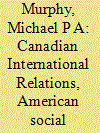

|
|
|
|
|
| Summary/Abstract |
The last two decades have witnessed growing attention to the “Canadianization” of the field of International Relations. In this article, we forward a novel approach to testing the influence of domestic factors in Canadian International Relations. By analyzing the reading lists of comprehensive examinations from Canadian doctoral programs in International Relations, we can understand the ways in which Canadian institutions’ reading lists construct the hierarchy of the field’s journals. Among these journals, those based in the United States are most frequently assigned, with others hosted in the UK and around Europe. Canadian journals are rarely assigned to reading lists. French-language journals are also rarely assigned to reading lists, even in francophone institutions, and when they are, the journals are much more likely to be hosted in France than in Canada. We offer a series of guiding questions for future consideration of the “Canadianization” of International Relations education in Canada.
|
|
|
|
|
|
|
|
|
|
|
|
|
|
|
|
| 2 |
ID:
174046
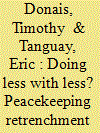

|
|
|
|
|
| Summary/Abstract |
The United Nations (UN) Secretary-General António Guterres’s Action for Peacekeeping initiative represents the latest in a series of efforts to make the UN’s peace and security architecture “fit for the future.” The Action for Peacekeeping initiative, however, has exposed two seemingly contradictory tendencies at work in contemporary peacekeeping. On the one hand, peacekeeping operations are increasingly expected to be lean, efficient, and performance-focused. On the other, expansive protection of civilians (PoC) mandates, which entail everything from predicting and pre-empting attacks against civilians to reforming state-level security institutions, are becoming increasingly central to contemporary peacekeeping. In this paper, we will suggest that as currently framed, the UN’s peacekeeping reform agenda—driven at least in part by downward budgetary pressures—will inevitably increase the gap between promise and performance with regard to PoC, with serious implications for the credibility and legitimacy of UN missions among the populations they are mandated to protect.
|
|
|
|
|
|
|
|
|
|
|
|
|
|
|
|
| 3 |
ID:
174044
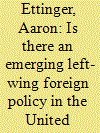

|
|
|
|
|
| Summary/Abstract |
Is there a left-wing foreign policy emerging in the United States? The rise of an energized and assertive left wing of the Democratic Party, and a receptive constituency within the electorate, has opened space for new political possibilities at home. In the foreign policy realm, leftist internationalism is making compelling arguments about new directions. However, there are limitations to the possible realization of a left-wing foreign policy in the US. While candidates like Sanders and Warren are distinctive in a left-wing foreign policy worldview, the practical implications of their foreign policies are consistent with post-Cold War practice. There are two important exceptions: in trade policy and in their positions on the use of military force. Here they mark a sharp break from the liberal internationalist mainstream. This paper outlines five broad principles of left internationalism, assesses the foreign policy positions of leading Democratic candidates for the 2020 nomination, and explores the long-term prospects of left-wing foreign policy in the US after 2020.
|
|
|
|
|
|
|
|
|
|
|
|
|
|
|
|
| 4 |
ID:
174047
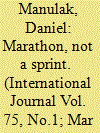

|
|
|
|
|
| Summary/Abstract |
In 2020, Canada does not maintain diplomatic ties with Iran or Saudi Arabia partly owing to their human rights violations—a choice which has eroded its capacity to act meaningfully in these countries. Thirty years ago, the Brian Mulroney government was faced with a similar decision: to sever relations with the white minority regime in South Africa or use its limited but real influence to contribute constructively to an end to apartheid. This article examines how Canada “punched above its weight” on an issue seemingly peripheral to its national interests from 1987 to 1990. It was during these oft-overlooked years—South Africa’s “darkest days”—that Canada engaged through multilateral fora, bilaterally, and its embassy to sustain global pressure and attention on apartheid. In so doing, the Mulroney government became a diplomatic battleground between its major allies, Pretoria, and its African Commonwealth partners. Such efforts were not without costs, but Canada’s “advanced middling” role helped to bring about a peaceful transition towards majority rule in South Africa and thus holds contemporary lessons for policymakers.
|
|
|
|
|
|
|
|
|
|
|
|
|
|
|
|
| 5 |
ID:
174045
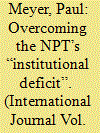

|
|
|
|
|
| Summary/Abstract |
Ever since the Nuclear Non-Proliferation Treaty was indefinitely extended in 1995, Canada has promoted the concept of “permanence with accountability.” Canada led on an ambitious initiative to enhance accountability via a reform package to overcome the NPT’s “institutional deficit.” Launched prior to the failed 2005 Review Conference, the effort was sustained for a decade. The priority goals were to establish annual meetings of states parties; to create a standing body of past, present, and future chairs; and to provide for the convening of extraordinary meetings. These ideas attracted support, but also opposition, from quarters less interested in having more effective tools of accountability put into place. The history of this initiative sheds light on the dynamics of multilateral diplomacy in the nuclear realm and on weaknesses in the Nuclear Non-Proliferation Treaty process that continue to threaten the authority of the treaty.
|
|
|
|
|
|
|
|
|
|
|
|
|
|
|
|
| 6 |
ID:
174048
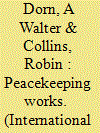

|
|
|
|
|
| Summary/Abstract |
Despite some harsh criticisms of United Nations (UN) peace operations, research demonstrates that many UN missions are successful, though evaluations depend on how success is defined. Even UN missions that fail in one or more aspects provide a net benefit to peace processes and help to save lives and alleviate human suffering. While an understanding of the flaws and limitations of peace operations can help improve the operations, some unfair criticism must be directly challenged. For instance, contrary to critiques in a recent paper by Séverine Autesserre, the UN has helped end civil wars, and it does not have a fixation on elections nor does it ignore the bottom-up approach. Most UN multidimensional missions pursue multiple levels of engagement, from local to national leaders. Elections are a key way to engage locals. With decades of experience, the UN has many positive lessons to offer in making, keeping, and building peace.
|
|
|
|
|
|
|
|
|
|
|
|
|
|
|
|
|
|
|
|
|